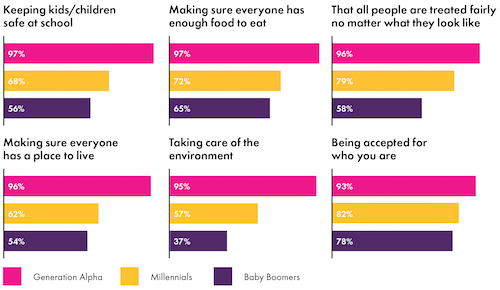Despite their young age, members of Generation Alpha—or those born after 2010—are highly conscientious and already maintain strong opinions regarding some of the biggest issues facing the world, according to recent research commissioned by US and UK-based tech PR specialist Hotwire.
Hotwire’s report, which sought to gauge the attitudes and opinions of America’s youngest citizens concerning some of the world’s most pressing topics, found that many members of Generation Alpha have already formed ethical and social stances as strongly as those formed by older generations later in life, suggesting that the opinions and viewpoints of this generation could become even more strongly formed than those expressed by Millennials today.
While 96 percent of Generation Alpha members believe that people should be treated fairly no matter what they look like, only 79 percent of Millennials and 58 percent of Baby Boomers said they considered this issue important when they were kids.
The concept of being accepted for who you are also ranked as a big issue of importance for Alpha respondents (93 percent), compared to 82 percent of Millennials and 78 percent of Baby Boomers.
Most Generation Alpha kids already fall under the umbrella of climate crusader as well. Virtually all (95 percent) of Generation Alpha members polled said they consider taking care of the environment to be an important issue, compared to only 37 percent of Baby Boomers and 57 percent of Millennials. And more than a third (38 percent) of Generation Alpha said they think it’s important to recycle too, compared to less than a quarter (22 percent) of both Millennials and Baby Boomers.
 Importance of issues among Generation Alpha respondents, compared to members of the Millennial, Baby Boomers generation when they were younger. Importance of issues among Generation Alpha respondents, compared to members of the Millennial, Baby Boomers generation when they were younger. |
When it comes to the issues that matter most to Generation Alpha kids, “keeping children safe at school” (97 percent), “making sure everyone has enough food to eat” (97 percent), ensuring that “boys and girls are treated fairly” (96 percent) and “making sure everyone has a place to live” (96 percent) were the issues to hold the highest rankings among these respondents.
Alpha members are also more likely to express similar viewpoints when it comes to gender issues. According to the report, Millennials and Baby Boomers are much more likely than Generation Alpha members to be divided across gender lines when it comes to issues pertaining to gender. For example, only two-thirds (66 percent) of Millennial and Baby Boomer men believe it’s very important for boys and girls to be treated fairly, compared to more than 80 percent of their female Millennial and Boomer counterparts. Among Generation Alpha, however, the difference in response between genders is much smaller: 79 percent of Generation Alpha boys believe it’s very important for boys and girls to be treated fairly, compared to 86 percent of girls.
The Alpha Generation is poised to become the most racially and ethnically diverse generation ever, according to Census Bureau projections. Already the Census Bureau is predicting that the 2020 U.S. Census could reveal a generation for whom only half of children under age 18 are non-Hispanic white (50 percent). Compare this to Baby Boomers (those aged 65 and older), for whom more than three-fourths are non-Hispanic white, according to Census Bureau data.
The Census Bureau further predicts that there will be no one ethnic/racial group that holds more than 50 percent of the population by 2045.
Altogether, the Hotwire report found that more than four out of five Millennials and Baby Boomers said they believe that Generation Alpha will hold a more diverse set of viewpoints and opinions than their generation.
Hotwire’s report, “Understanding Generation Alpha: The Most Diverse Generation Yet” surveyed more than 3,020 kids and adults, including more than 1,000 members of the Alpha Generation (those between seven and nine years of age). Research was conducted in September by C+R Research.


 Abandon traditional content plans focused on a linear buyer progression and instead embrace a consumer journey where no matter which direction they travel, they get what they need, stressed marketing pro Ashley Faus during O'Dwyer's webinar Apr. 2.
Abandon traditional content plans focused on a linear buyer progression and instead embrace a consumer journey where no matter which direction they travel, they get what they need, stressed marketing pro Ashley Faus during O'Dwyer's webinar Apr. 2. Freelance marketers and the companies that hire them are both satisfied with the current work arrangements they have and anticipate the volume of freelance opportunities to increase in the future, according to new data on the growing freelance marketing economy.
Freelance marketers and the companies that hire them are both satisfied with the current work arrangements they have and anticipate the volume of freelance opportunities to increase in the future, according to new data on the growing freelance marketing economy. Home Depot's new attempt to occupy two market positions at once will require careful positioning strategy and execution to make it work.
Home Depot's new attempt to occupy two market positions at once will require careful positioning strategy and execution to make it work. Verizon snags Peloton Interactive chief marketing officer Leslie Berland as its new CMO, effective Jan. 9. Berland succeeds Diego Scotti, who left Verizon earlier this year.
Verizon snags Peloton Interactive chief marketing officer Leslie Berland as its new CMO, effective Jan. 9. Berland succeeds Diego Scotti, who left Verizon earlier this year.  Norm de Greve, who has been CMO at CVS Health since 2015, is taking the top marketing job at General Motors, effective July 31.
Norm de Greve, who has been CMO at CVS Health since 2015, is taking the top marketing job at General Motors, effective July 31.


 Have a comment? Send it to
Have a comment? Send it to 
No comments have been submitted for this story yet.